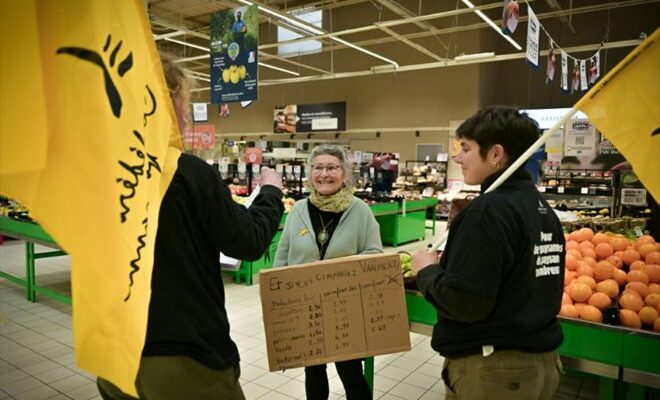A nutriscore but to promote French origin: the government wants to set up an indicator on the labels of food products to inform customers about the origin of ingredients (AFP/Archives/LOIC VENANCE)
A “nutriscore”, but to promote French origin: the government announced Thursday its desire, welcomed by distributors and consumer associations, to set up an indicator on the labels of food products to inform customers about the origin of ingredients.
“We need more transparency”, particularly on processed products, to guide consumers in their “purchasing decisions”, said the Minister Delegate in charge of Business, Tourism and Consumption Olivia Grégoire on Thursday at the microphone of Sud Radio.
Mentioning the anger of farmers in recent weeks, she hopes that this new “origin-score”, inspired by the “nutriscore”, will also allow a better understanding of “the prices” charged.
“Sometimes you decide to buy a little bit more expensive because it’s French,” she observed.
Manufacturers, distributors and consumer associations will be received from mid-March to discuss the still vague contours of this indicator, but which would highlight products which contain more ingredients of European or French origin.
On a voluntary basis, interested manufacturers will be able to enrich their labels with this indicator “before summer”, indicated during a telephone press briefing the ministerial office, which then aims to bring the generalization of this measure to the scale of the European Union in 2025.
– Enthusiasm and requirements –

“We are ready!”, Olivier Andrault, food project manager at UFC-Que Choisir, responded to AFP, “absolutely up for it” to participate with his consumer association in the development of this indicator (AFP/ Archives/JACQUES DEMARTHON)
“We are ready!”, Olivier Andrault, food project manager at UFC-Que Choisir, reacted to AFP, “absolutely ready” to participate with his consumer association in the development of this indicator, by however, showing vigilance: “volunteering is rarely sufficient to fully inform consumers”.
On the social network
“The government’s proposal is good, if U and Leclerc agree, we can consider a collective approach,” Thierry Cotillard, head of the Mousquetaires (Intermarché), told AFP.
The group launched a similar system on the raw materials of its distributor brands in 2019. An experiment which “worked” according to Mr. Cotillard, but the “packaging constraints” limited the possibility of details. It offers the possibility of a mobile application.
– Experimentation –
For this system, Bercy was particularly inspired by an experiment by the En Vérité association, which brings together around sixty agro-industrial brands, including for example D’aucy and Babybio.
Last September, En Vérité affixed a logo indicating the French origin to the packaging of some products from its member brands.
With “significant results”: yogurts using strawberries and French milk, therefore a little more expensive than their competitors, saw their sales “double” over the period of the study, going from “9% to 18% of market shares”, underlined David Garbous, president of the collective.
“The shift in sales occurred mainly thanks to CSP+” (higher socio-professional categories), explained the former industrialist to AFP. “But people who are a little less well-off have also turned to these products with the idea, for example, of supporting farmers.”

Activists from the Confédération paysanne in a supermarket in Condé-sur-Sarthe, in Orne, January 31, 2024 (AFP/Archives/Lou BENOIST)
In recent weeks, in the context of the crisis in the sector, French farmers have gone to supermarkets to protest against certain products of foreign origin.
The Minister of the Economy Bruno Le Maire announced on Wednesday that checks in 1,000 establishments concerning the French origin of the products marketed revealed 372 non-conformities between the origin of the product and what was displayed on the packaging.
Of these 372 anomalies, 70 are “serious”, said Olivia Grégoire Thursday morning. They would relate more to the “will” to deceive the consumer about the origin of the product, than to “forgetfulness” or “negligence” in display, and are likely to constitute a criminal offense, detailed his office. .
© 2024 AFP
Did you like this article ? Share it with your friends using the buttons below.




